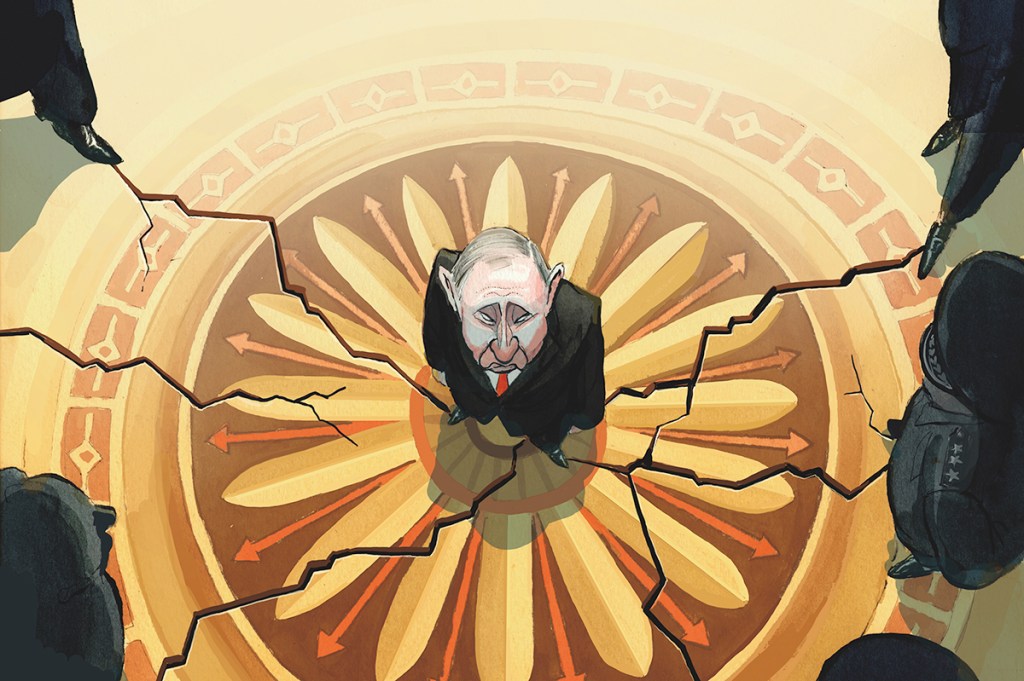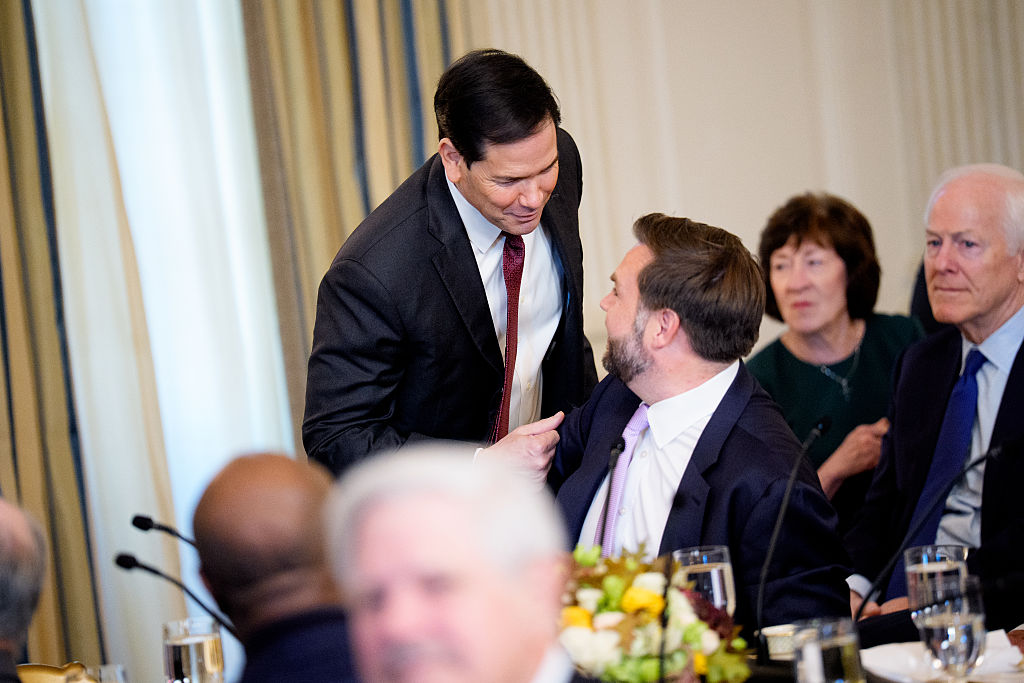There’s a delicious Russian verb that derives from the criminal underworld: “koshmarit,” literally “to nightmare someone.” It usually denotes how authorities give criminals, or anyone they dislike, so much relentless hassle from so many different angles they bend them to their will. Vladimir Putin, always keen to bring mafia language into politics, was the first Russian statesman to make use of it in public – he once instructed his authorities to stop “nightmaring” the business community.
I keep returning to that word when I think of how Putin’s own foreign policy could be restrained to make real the Reaganite slogan that helped Donald Trump win the election: “peace through strength.” As we enter the negotiations season of the Russian invasion of Ukraine, holding Putin back will be ever more important. The Putin approach to ceasefires is to set them, break them and then kill even more people while the other side desperately tries to cling on to the tatters of the agreement. We saw this in Syria, when a UN Security Council ceasefire resolution was adopted in February 2018. After a short drop in bombing against civilians, Syria’s Bashar al-Assad and Russian forces tested international will before bombing more intensely than ever, safe in the knowledge that there would be no consequences.
The trouble with Joe Biden’s approach to restraining Putin was how ponderous and overly cautious it could be. The US blocked Russia’s central bank from buying and selling dollars at the start of the Ukraine war, but then left opportunities for its energy companies to trade in western currencies. US sanctions and arms shipments to Ukraine felt more like signaling that America was in this for the long term – but would never risk “escalation.” When the Russian system was shocked into paralysis – such as during the Wagner Group mutiny or the Ukrainian incursion into Kursk – America sat back and let the Kremlin deal with its internal chaos. That sort of incrementalism is not how you rattle Russia and get Putin to reconsider the wisdom of his ways. If you give the Russian President time and space to solve a challenge – economic, military, social – he will pause, ponder and then find a way around it. The trick is to act asymmetrically, hitting Putin with the thing he least expects, and then pile on problems in quick succession so they become impossible to deal with. In other words: to nightmare him.
This gets to the essence of Putin’s insecurities. In his more candid interviews from 2000, Putin spoke of his shock at how quickly the Soviet leadership lost its grip on power and his bewilderment at how easily things slid out from under the government’s control. This paranoia now permeates Putin’s policies. His reputation is built on the idea that he is, in the Russian idiomatic expression, a “strong hand,” and his propaganda model is built on avoiding revealing he is a weak one. Thus he is always going out of his way to create the impression that he has everything under control – and backtracking when that impression is in danger. Since a botched mobilization lead to almost a million Russians fleeing the country he hasn’t touched the subject, choosing instead to pay each soldier $30,000 to sign up. After ISIS terrorists mass-murdered 145 Russians and injured 500 at a posh Moscow mall last year, news of the atrocity has been largely absent from Russian television: the Kremlin doesn’t want anyone dwelling on how weak its security system really is.
Or consider why the Kremlin refuses to shift on its 20 percent interest rates, despite appeals from business. One motivation, argues Vasily Gatov, a fellow at the Annenberg Center on Communication, is that Putin fears that pensions, which are indexed to inflation, will suffer if he changes rates. Pensioners have nothing to lose and might protest en masse. When they did so in 2005 and 2018, the Kremlin decided to back down. It’s not that Putin is scared of babushkas storming Spasskaya Tower. But the fact that they could protest would be a sign that Putin is losing control – and that’s not a signal any dictator is comfortable sending. If Putin’s approval rating falls to 50 percent, as it did after the Kursk incursion, the system starts to panic. When one vulnerability appears, they fear others will follow.
But the fact is that the vulnerabilities in the Putin system are actually legion – it’s just that no one has been systematically exploiting them with the required intensity. Domestically, the war economy has produced polarization between the regions that have suffered from the sanctions and those that have done well out of industrial production. But even in those that are doing well, people are unhappy with inflation and are taking out massive payday loans. It’s useful to contrast the Kremlin’s propaganda with what people are saying online and actually doing. When the data company Filter Labs, which I have collaborated with, compares discursive and behavioral data in Russia it finds that, while the Kremlin encourages people to save and have faith in the ruble, Russians are having none of it. They remember the wild 1990s and think the ruble is untrustworthy. Inflation is so high that businesses no longer see it as worthwhile to deliver supplies to the Army – it’s easier to just sit on their money than fulfill contracts. Inflation is driven by defense spending, which makes up some 35 percent of the budget, so Putin can’t take the brakes off. Meanwhile the Kremlin’s reserve fund is running low: more than half of it has gone.
You can feel the pinch on the front lines already. The Kremlin has been quietly lowering the sums offered to new recruits. Ethnic tensions are so bad Russians have been giving up the coordinates of Chechens during Ukrainian attacks. Families on the home front worry that the Army is leaving the corpses of soldiers on the battlefield to avoid paying compensation to their kin.
As recruitment becomes harder, North Koreans have been called in – a sign of desperation. And after several years of war, western researchers have worked out the vulnerabilities in Russian military supply chains. A report by the Open Source Centre shows, in granular detail, how you can subvert the supplies of chromium, for example, that Russia needs to make its howitzers. Too many sanctions have been haphazard in the past. But now our understanding of Russia’s vulnerabilities has become surgical and it is possible to apply a whole range of levers – not just economic but also cyber – to undermine them. And for all its daunting military production, Russia will this year run out of some Soviet-era military tech that they can’t replace easily. The country may soon want a pause in the war itself.
Russian military bloggers are already complaining about the Chinese tech at the front. As one wrote, sarcastically: “They’ve started producing refurbished drones under the guise of new ones. With unpredictable characteristics and quality.” Others go further, describing China as a “geopolitical enemy” due to its decision to “cut off our supply of [drone] components” to comply with US sanctions. Indeed, the reaction across the Russian internet to China imposing US sanctions was furious. As a Filter Labs study shows, while Kremlin propaganda kept a neutral tone on the subject, sentiment toward China dipped sharply on the internet in Russia.
Trump is not wrong to think there are potential cracks in the relationship between Moscow and Beijing. They do not appear, however, at the level of the two countries’ leaders, who seem serious about their “no limits” friendship. But the general public in each country is deeply suspicious of the other, and business elites in both are doubtful. Chinese business can feel it is being pulled down with a sanctioned Russia and missing out on better markets. Russians fear that the Chinese just want to exploit them.
The dilemmas each country faces can be increased by keeping the economic costs for dealing with Russia high. That way you make Putin worry that the Chinese might not back him if he breaks ceasefires too aggressively and the cost for China of doing business with Russia increases every time he does so. Especially as Chinese state media already disapproves when Moscow takes steps that lead away from peace.
Putin’s ability to project international power is a great part of his “strong hand” image. Moscow works doubly hard to tell its own people, and the world, that it is flourishing despite attempts to isolate it. At the BRICS summit in Siberia last November, Iran, China and Russia all celebrated their common desire to end the dollar’s dominance of the world’s financial system and America’s global primacy.
But the truth is that much of Putin’s global prowess is a bluff. The fall of the Assad regime caught Moscow unaware and brought furious criticism not just online, but from thinktankers close to the military’s General Staff. “You can bluff in the international arena for a while – but make sure you don’t fall for your own deceptions,” wrote a retired colonel in the usually loyal broadsheet Kommersant.
None of Putin’s issues are in themselves a silver bullet to knock out the Kremlin. The trick would be to apply pressure on them simultaneously to stop the President misbehaving. Hit him by seizing frozen Russian assets in the West or undermining Russian oil sales, then follow with a campaign to sow dissent among Russian soldiers, depress his domestic popularity rating, launch military exercises in the Baltics, undermine Russian mercenaries in Mali, give the Ukrainians the right to hit deep inside Russia, make the cost of doing business with Russia higher for the Chinese, cut vital supply chains for the Russian military to signal that we know every front company they use. Pile on the dilemmas until the Kremlin feels it runs the risk of not being in control. Raise the specter of 1991 and the dissolution of the Soviet Union to get the Kremlin to recalculate the level of belligerence it can afford. Some of the moves can be smaller, others larger. Destabilizing the Kremlin is about the rate and pace of those moves.
This is something that, so far, has not been tried. Instead the opposite is happening. As Putin looks at how America is alienating allies, damaging its own economy and retreating from global leadership, he must wonder whether it’s going through a self-imposed breakdown. Even as Putin engages in friendly phone calls with Trump, he’s strengthening military exercises with Iran and China.
Russia is also able to sweet-talk America while secretly stabbing at it. In his war on the “Deep State,” Trump has disbanded some of the entities that deal with Russian cyberattacks and covert campaigns in the US. It’s easier than ever to hit America using proxies. Dark Storm, the cyber-criminals who recently took down X to express their support for Palestine, have previously aligned their hacks with Russia as well as Iran. Similar groups have taken out the websites of American water companies and hospitals. Russia’s secret services aren’t likely to have seen an America this vulnerable.
Putin’s dream of destroying the world order America upheld is so close he must feel he cannot fail to grasp it. But there may be a twist in the tail for Russia. As we enter a world of global lawlessness, countries and coalitions will be thinking about turning the Kremlin’s hybrid toolkit of economic and information war, cyber and sabotage back on Russia.
Up until now, with America guaranteeing security, many showed restraint. With the “international-rules based order” gone, everyone can try the hooligan role Russia has so far played unimpeded. Moscow yearns to carve up the world. But it will be a world where everybody’s knives come out.
This article was originally published in The Spectator’s May 2025 World edition.























Leave a Reply